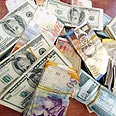
'Deviations from the norms become new norms'
צילום: עטא עוויסאת
Something's rotten in Israel
Latest drop in global corruption index yet another warning sign
The annual Global Corruption Report published by Transparency International Monday ranked the level of public corruption in more than 100 countries - from the cleanest to the most corrupt. The Corruption Index doesn't rely on quantifiable data such as the number of people apprehended for crimes of corruption or the number of investigations carried out.
It is based on public opinion polls and questionnaires filled in by experts. This is why Transparency International has named it The Corruptions Perceptions Index.
In the past, Israel was positioned at a reasonable level: In the beginning of 2000 we were ranked 22nd among the world's non-corrupt countries. Even then, North European countries (Sweden, Norway and Iceland,) developed western countries, and Singapore were ranked ahead of us.
I had the honor at the time of serving on the Israeli branch of Transparency International and I took great pride in our level of integrity.
Now according to the 2006 index as published in Vienna Wednesday, Israel's ranking has dropped to 34. It should be noted that the lower the ranking the more corrupt the country is perceived to be. In 2004 we were ranked 26 and last year took the 28th spot. In one year we nosedived six positions in the public corruption index. At this rate we'll get to the bottom of the list by the end of the decade.
Finland as model
Which countries ranked higher than us? It's hard to believe: This year Estonia, Uruguay, Qatar, United Arab Emirates, Barbados, Portugal and the gambling capital of Asia, Macau scored higher than us.
True, 130 countries are ranked beneath Israel and they are all perceived as being more corrupt than us. Closing the list are several dubious countries such as Sudan, Congo, Bangladesh, Uzbekistan and Burma (Myanmar). Russia is ranked 121.
International Transparency sources noted the close link between poor countries and corruption. This is not surprising. Corruption of the public sector is synonymous with unjust tax. It distorts designation of economic resources, diverts business activities to inefficient channels and perpetuates poverty.
Simultaneously, a strong positive correlation was found between the public administration and honest corporations and between the wealth of a state, its residents' standard of living and the economy's perennial growth. Finland for example, the most competitive country worldwide, with one of the world's most highly developed high tech industries, has one of the most uncorrupt public sectors in the world.
Finland did not achieve this status due to its natural resources or geographic location. On the contrary: For years it was considered a backward economy. With the collapse of the USSR it underwent a painful economic crisis, from which it emerged by its own force, thriving ever since.
Why can't Israel achieve what Finland did? Why are we deteriorating while Finland is not?
Prime ministers under investigation
Look upwards and you'll find the answer. The distinction between what is permissible and what is not in the public service begins with the prime minister and the president - and is channeled down the ranks. When the leadership is tainted, it sticks to everyone. Deviations from the norms become new norms, the pursuit of personal gains becomes the game of the season, and walking on the edge of the law is viewed as sophistication and not as a mark of shame.
In Finland, to the best of my knowledge, not a single president was forced to retire for accepting funds from a millionaire, and not a single president was accused of sexual harassment. In Finland, not a single prime minister in the last decade has been investigated on suspicion of corruption. In Israel, every prime minister in the last decade has been investigated - either on suspicion of blackmail, breach of trust, or for breaking the laws of election campaign funding.
Finland is free of corruption not because there is no connection between capital and government. On the contrary, many such bold ties exist. Yet they are not corrupt. And this is what makes all the difference. Corruption is not the natural outcome of an economic structure or political regime; it is the outcome of personal choice of a public figure who asks himself or herself: To be or not to be corrupt, and answers this question according to his or her scruples.
In an interview with Yedioth Ahronoth newspaper, Nobel Prize laureate Professor Aaron Ciechanover described Israel's leaders today as "constantly facing a moral question mark…only the national anthem and the flag are yet to be probed."
During the recent memorial ceremony for Prime Minister Yitzhak Rabin, celebrated author David Grossman added a term of his own: "Our leadership is hollow," he said. However, it seems that in light of the latest ranking in the public corruption index we can use less literary terms and say outright: There is something rotten in the state of Denmark.










